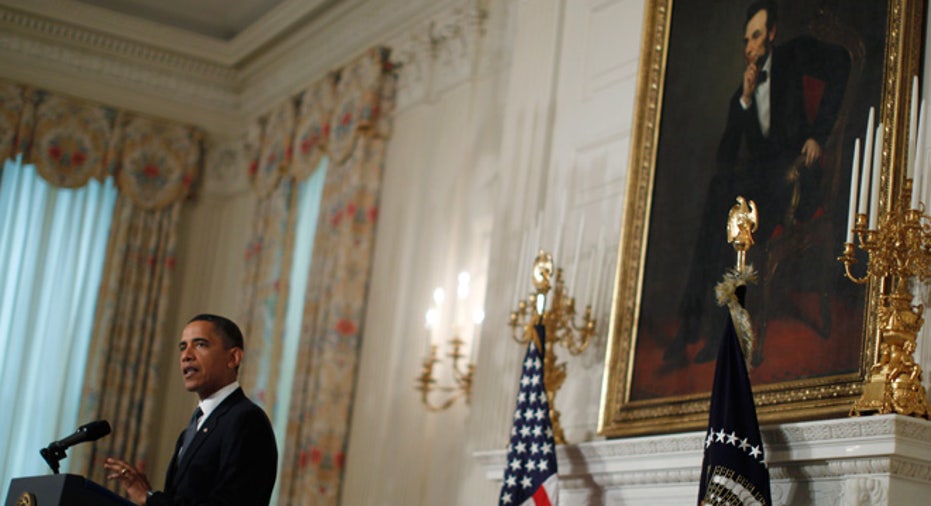Sorry, Mr. President, You're No Abe Lincoln

Now we know. President Obama is set to go. With the wave of a pen, he’s ready to delay deportations for up to 5 million illegals. Republicans already are fuming, arguing the President can’t even legally do this.
But again, he will do this. And among all the reasons justifying his likely action, none struck me as much as South Carolina Democratic Rep. Jim Clyburn’s – that this is what great presidents do.
Clyburn explains both Abraham Lincoln and Harry Truman used their executive authority to get an un-budging Congress to move. “I think that President Obama ought to put himself alongside these great presidents,” he told MSNBC, “and use an executive order to do something big on immigration.”
Translation? This would be Lincolnesque for the President to do.
No offense to the Congressman, for whom I have great respect, but I studied President Lincoln. President Lincoln is like an historical friend of mine. “Mr. President, you’re no Abraham Lincoln.”
For one thing, many of Lincoln’s executive orders were pushed at a time of war, and most were related to his duties as Commander-in-chief of that war – including perhaps his most controversial move, suspending habeas corpus, or the right of any person under arrest to appear before a court to ensure they had not been falsely accused.
Even under martial law, President Lincoln came under intense fire for this decision. But he argued that it was essential for preserving the Union. “Are all the laws, but one, to go unexecuted, and the government itself go to pieces lest that one be violated?” Lincoln asked. And in such an event, “would not the official oath be broken, if the government should be overthrown, when it was believed that disregarding that single law, would tend to preserve it?”
Privacy rights advocates have argued in the years since, and the many instances of other Presidents taking similar liberties in the face of war – President Bush, for example, at the time of the Iraq War – have taken executive orders to whole new dangerous levels.
But step back and see the difference here. Whatever your views on the constitutionality of either President Lincoln’s actions during the Civil War, or President Bush’s in the midst of the Iraq War, each were dealing with very real threats to our country. The argument for each and both was the security of the nation itself.
Can anyone seriously make that claim now? How could Rep. Clyburn seriously connect the safety of its legal citizens at a time of conflict, with the preferential treatment of those who aren’t even citizens at a time such an action could itself incite conflict?
Leaving aside the President himself stated little more than a year ago, that the Constitution didn’t give him such power (I’m President, not Emperor, he claimed), how is it now things have changed? Or the security of the United States been imperiled enough to justify this remarkable reversal?
And to what end?
Presidents who take power into their own hands must justify conditions that leave them little choice. Lincoln was working under the pressure of war, and an escalating crisis that could have released potential instigators out on the streets. I’m not justifying his actions. I’m just explaining the very different environment in which he took those actions.
Lincoln knew full well the controversy his move would trigger. But he knew as well the bedlam not suspending habeas corpus might trigger as well. That’s why he clearly telegraphed his move. Everyone knew it was coming, which is very different from President Obama’s planned deportation move, which he delayed for political purposes until after a midterm election, in the hopes people wouldn’t make as big of a fuss of it coming.
It just strikes me as odd that a President will use tortured negotiations with a Republican Congress, as justification for ignoring that Congress – essentially deciding, “if they don’t do what I say, I’ll just do it myself and make it law.”
That’s Congress’s responsibility. Not the President’s. And when it comes to national security matters, that’s about looking after the safety and economic wellbeing of legal citizens, not those who are neither legal NOR citizens. It’s a slippery slope to apply Lincolnesque standards to what appears more politically expedient acts.
One’s a giant for risking such matters in the midst of war. The other, anything but, pushing far different matters, and all but inciting war. It’s even more insulting when otherwise decent men like Rep. Clyburn knowingly hint courts will resolve such matters -- clearly acknowledging the President is overstepping his bounds but hoping in the meantime, he can just have his way while running out…the clock.



















